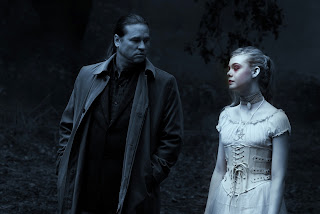DVD Review - Twixt
 |
| Val Kilmer (left) and Elle Fanning in Francis Ford Coppola's horror film "Twixt" |
Val Kilmer stars as Hall Baltimore, a writer on a book tour who visits a small town called Swann Valley that he learns is haunted by a mass murder that occurred in 1955. He meets the old creepy sheriff named Bobby La Grange, played by Bruce Dern, who pitches Hall an idea for a new book based on the recent murder of a young girl named Virginia, played by Elle Fanning. Virginia may or may not be a vampire but she appears in Hall's dreams as a ghost. In his dreams, the ghost of Edgar Allan Poe also visits Hall to help him solve the murder of the girl as well as the previous murders.
What helps to ease the audience into the film is Coppola's sense of humor as well as Kilmer's comedy here and there. There is a lot to mine in the setup of Hall Baltimore, as a slubby, middle-aged, washed-up writer who boozes too much and is in a small town for an empty book signing about a book on witches. There are several scenes of Hall trying to write on his laptop computer in his hotel room. All of them are suprisingly hilarious.
Hall calls his wife Denise via Skype and Coppola has them play out a funny situation where Denise holds hostage Hall's vintage copy of Walt Whitman's Leaves of Grass. In a later scene, Hall is in writer's block over one line and Kilmer is allowed basically to riff to show Hall overcoming the block. He does so by saying the line over and over again in different voices from Marlon Brando to what he describes as a gay basketball player from the 60s. It's all a laugh riot.
What also helps to ease the audience into this film is Coppola's crazy and beautiful cinematography and art direction, particularly during his dream sequences. Two striking visuals are two wide shots where Kilmer walks outside toward a multi-face clock tower as its bell rings. The colors are muted, not totally black-and-white but bluish. There's a similar shot of Kilmer heading into the woods and the compositions for both are very well done, if not singularly amazing.
Other shots in the dream sequences are well done too, but what hurts the film is the fact that Coppola gets a little lost in these dream sequences. Coppola has Edgar Allan Poe visit Hall almost like the Ghost of Christmas Past and guides him in certain instances. The problem is Coppola dwells in this too long where Poe is at one point explaining his writing process, which made Twixt start to feel like a dark, twisted version of Midnight in Paris.
It slows the movie down and drags it to a crawl. It becomes highly boring until until a gory and blood-soaked ending. Coppola seems more in love with his literary influences or inspirations for his crazy characters than telling a strong narrative, at least in this case.
Two Stars out of Five.
Rated R for some bloody violence.
Running Time: 1 hr. and 27 mins.










Comments
Post a Comment